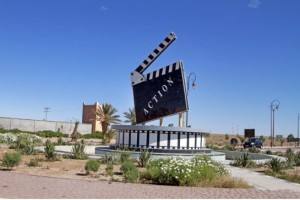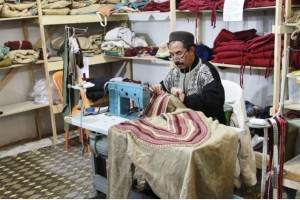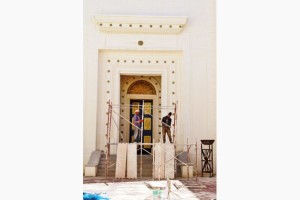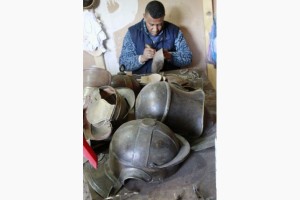Toronto Star
AP
Paul Schemm
Movie maker hunger to make bible stories and thrillers, plus this north African country’s political stability, have it a film-making capital. It helps that Morocco, like Toronto, can stand in for many locales. But competition with other regions is fierce, and what do filmmakers want more, even, than to shoot movies? Tax breaks.
Movie-themed municipal art on a traffic circle in the city of Ouarzazate, where dozens of foreign movies are filmed every year. This past year has been a banner one for filming in Morocco.
“QUIET!” The cry rings out in English, French and Arabic across the cobblestoned streets of Jerusalem, as filming begins for a scene in the series A.D. The Bible Continues.
But while the arched doorways, balconies and furnishings all say Roman-era Israel, the real-life setting is southern Morocco.
Viewers in America and elsewhere in the world may not know it, but they have seen a lot of Morocco in the past year. It has served as the Baghdad of American Sniper, the Tehran seen in TV series Homeland, the Mali of American Odyssey and the Egypt that will appear in the miniseries “King Tut.” Morocco has also been Somalia numerous times, including in the 2001 film Blackhawk Down, and more recently in the 2013 Captain Philips. And it will be Saudi Arabia in this year’s Hologram for a King starring Tom Hanks.
All in all, it has been a banner year for Morocco’s status as a gigantic film-set — with $120 million (figures are in U.S. dollars) spent by foreign film productions in the country last year, more than in the past five years put together.
The North African kingdom is riding high on its reputation for stability and exotic locales, but industry officials say that Morocco needs to do more — and offer more incentives — to realize its potential as a filming destination. It is contending with increasingly stiff competition from South Africa and other countries that offer deep tax rebates.
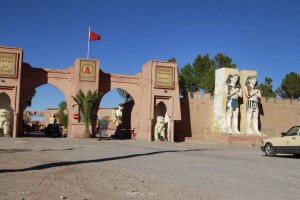
The entrance to the Atlas Studio where several major American movies have been filmed in Ouarzazate.
For Morocco’s film industry, the future depends on the right package of sweeteners to persuade studios to do more than just film exteriors here but also use local facilities. The ultimate goal is to get Hollywood to film entire movies in Morocco, said Sarim Fassi-Fihri, head of the Moroccan Center for Cinematography, which oversees the industry.
“The day tax incentives come to Morocco, the whole industry will move here,” he said, cutting a cinematic figure himself, sporting a fedora and puffing on a cigar. “If we make $120 million today, with tax incentives we could go up to $200-$250 million.”
He pulled out a sheaf of publicity brochures from competitors in Turkey, Colombia, Macedonia, the Netherlands, Ireland, even the Canadian province of Manitoba, with promised tax rebates of 20-40 per cent plastered across the covers to entice film companies.
Ever since 1962, when David Lean filmed scenes from “Lawrence of Arabia” in Morocco, film companies have been using its deserts, mountains and cities as stand-ins for exotic locations. At the vast Atlas Studios complex in Ouarzazate — Morocco’s desert Hollywood perched between the High Atlas and the Sahara — there are sets from dozens of movies from the past decades.
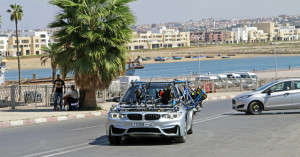
Tom Cruise drives a car covered with cameras during the shooting of a scene for Mission Impossible filmed in Rabat, Morocco.
Here, it’s possible to ride the camel used by Nicole Kidman in the upcoming Queen of the Desert past the pharaonic sets from 2002 French film Asterix and Obelix Meet Cleopatra to the fortifications Ridley Scott built to recreate medieval Jerusalem for the 2005 crusader film Kingdom of Heaven.
Morocco has fallen in and out of fashion as a movie set over the decades. One mainstay has been biblical films, and that business is booming now with the bible-craze taking off in America. At one point over the winter, there were three actors playing Jesus in different productions staying at the main hotel in Ouarzazate.
The new boom comes off some lean years, beginning with the 2008 global financial crisis and exacerbated by the 2011 Arab Spring unrest that led insurers to pull film companies out of the Middle East. But in the case of Morocco, they came back.
Morocco stands out for being blessed with the people and landscapes needed to satisfy renewed interest in the Middle East, while having none of the agitation common elsewhere.
“The Arab Spring did help us, actually, when everyone was more worried to come to Tunisia and everywhere else, they were coming to Morocco because it was a lot safer,” said Khadija Alami, head of one of Morocco’s several local production companies that partner with international companies.
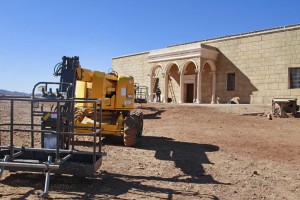
Filming equipment outside the arched set for Pontius Pilate’s palace in the TV series “A.D.” in Ouarzazate.
Alami first worked on the 1985 Chevy Chase comedy Spies like Us, soon followed by “Ishtar,” before founding her own production company in 1998. It organizes crews, permissions and filming locations for shoots.
The industry has also been boosted by official support. While the state has yet to approve tax rebates, it does make it easy to work in Morocco and is happy to lend the services of the Moroccan army for a reasonable fee.
Aside from the helicopters, the military equipment used in Blackhawk Downlargely came from the Moroccan army. Soldiers also often play extras when huge crowd scenes are called for.
The government even allowed the main highway between Marrakech and the seaside town of Agadir to be closed for three weeks last year for Mission Impossible 5. Local media later credited the closure for a drug bust, after a car full of cocaine ran afoul of a police checkpoint in the detour.
Most important is Morocco’s reputation for tolerance regarding themes other Muslim countries might find unpalatable. Biblical stories are out of the question in some conservative countries and the current vogue for thrillers set in the Middle East is too political for many Islamic countries.
“There is a big boom here because of its nature as the most liberal of the Muslim countries,” said Eamon Patrick, a line producer for A.D.
“So any filming that uses a contemporary Middle East setting, they do a lot of it here,” Patrick said.





